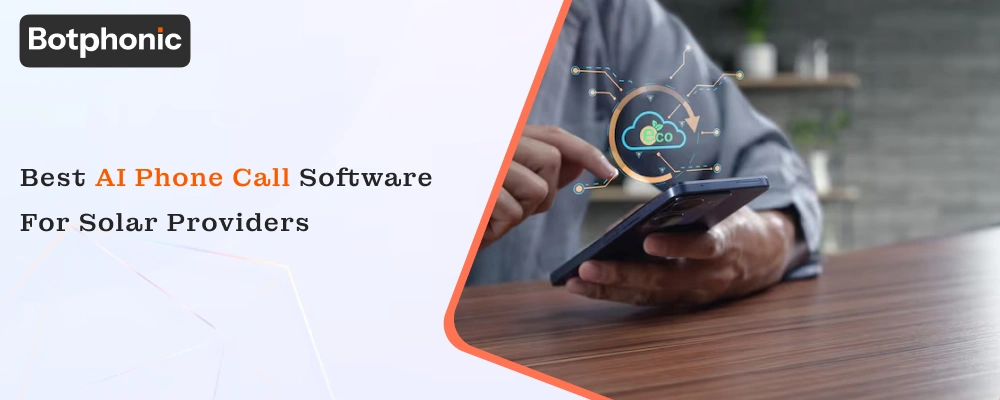
Summarize Content With:
Quick Summary
In this long-form guide, which is especially designed to make a conversation into a conversion. We will be demystifying why solar companies have started implementing AI phone systems and what exactly they should look for in an AI phone call software
. Moreover, we will also be going through some of the best AI phone call software for solar providers, so you won’t have to go through the trouble, and just choose what’s best for you.
Introduction
If you go into the market and ask any seasoned solar operator, What’s difficult these days for you? They all might give similar answers, such as rising ad costs, stricter utility regulations, homeowners rapidly looking for comparison rather than shopping, and sales teams in every company who are going through the same juggling calls. The solar sector is growing, and with growth comes expectations along with a new level of operational complexity.
And that’s one of the main reasons why AI phone call tools have become the quiet workhorses behind high-performing solar teams.
Speeding up response times, effectively improving qualification, while ensuring not a single solar lead slips through the cracks. And most importantly, this is the aspect that’s allowing solar providers to stay competitive while also keeping their reps focused on winning the conversations that count.
Let’s get into the best AI phone call software for solar companies in 2025, and how to use these tools without losing the human touch that the solar industry still demands.
Why Solar Companies Are Turning to AI Phone Systems
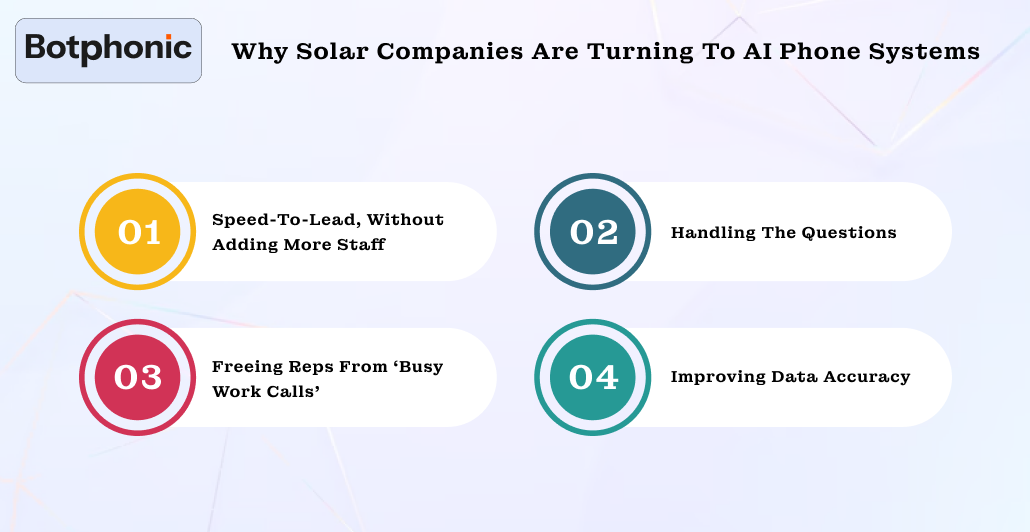
Solar sales have always been considered a contact sport. Speed, clarity, and consistency are what make a provider stand out. But as the market is tightening, traditional call center models are now starting to feel outdated. Even companies and providers are asking more from their tech stack:
- Faster callback times
- Smarter qualification
- Less manual dialing
- Better lead follow-up
- Cleaner call tracking
- More efficient handoff
Even though homeowners have almost zero patience for missed calls, long hold times, or callbacks that arrive much later than expected. Integrating with an AI lead integration tool can easily help you with these gaps, but only if it’s built smartly and deployed strategically.
Here’s what AI is doing, especially in the solar world:
1. Speed-to-Lead, Without Adding More Staff
Lead comes in, AI will proceed by calling immediately, and will effectively book the appointment or just prequalify it on the spot.
This single feature alone can help boost conversion rates significantly. With no exaggeration. Homeowners who most likely fill out a solar inquiry form are usually price-comparing multiple installers. Just five minutes can make the difference between a booked appointment and a lost lead.
2. Handling the Questions
Solar conversations are just way too predictable, which makes them one of the most perfect industries that can be AI-assisted handling.
AI phone assistants can easily give answers to questions, such as:
- “What incentives am I eligible for?”
- “How much do panels cost?”
- “Will I qualify if I have shading?”
- “Do you service my utility?”
- “How long does the installation take?”
3. Freeing Reps from ‘Busy Work Calls’
Most call volumes at a growing solar company have nothing really to do with real buying conversations.
- People are continuously asking about appointment times
- Rescheduling
- Bill upload reminders
- QA rule confirmations
- “I think I left a voicemail earlier. Did you get it?”
AI is good at clearing this clamorous task.
4. Improving Data Accuracy
It’s human nature to make mistakes; they might even forget to log notes. Moreover, there might be situations where they might mistype utilities or mark the wrong lead status.
But having an AI call assistant, you can rest easy. They never make these mistakes, and even improve close rates downstream easily.
What Solar Providers Should Look For (No-Nonsense Criteria)
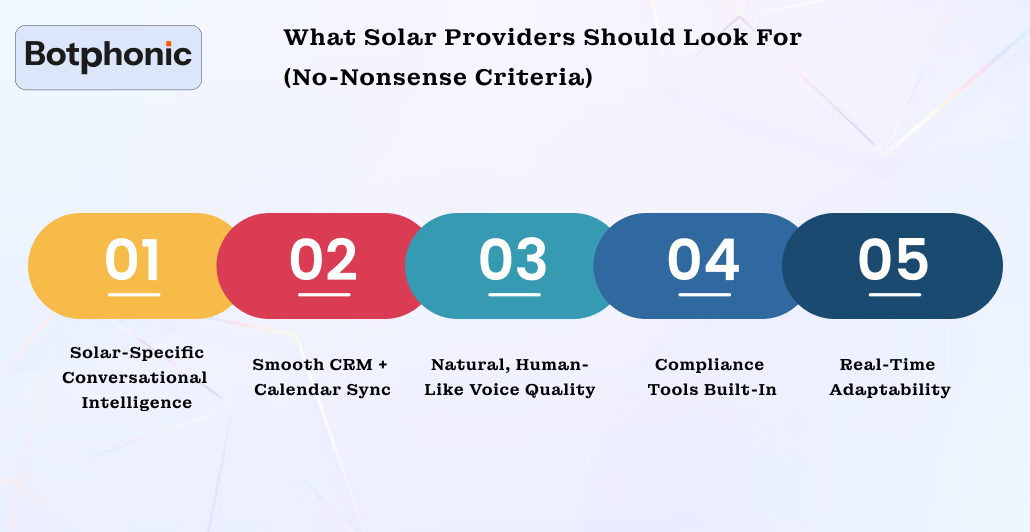
Every software vendor will tell you exactly the same thing: ‘they are revolutionizing solar.’ Don’t ever get into these chit chats and always focus on features that help you move revenue in real time.
1. Solar-Specific Conversational Intelligence
You need a smart AI call assistant, that’s especially trained or customized for:
- Net metering rules (per state/utility)
- Consumption-based
- Common incentives
- Bill analysis workflows
- Roof structural qualification
- Typical objections
- Off-grid vs grid-tied distinctions
- HOA questions
Generic AI phone assistants usually can’t handle these tasks well.
2. Smooth CRM + Calendar Sync
You are just increasing your task, if your AI can’t add details into:
- Salesforce
- HubSpot
- GoHighLevel
- Zoho
- JobNimbus
- Copper
- Aurora/Spam/Enact integrations
3. Natural, Human-Like Voice Quality
We have all encountered AI calls where it just sounds like the system drank about 5 cups of synthetic coffee. Don’t make your prospects regret calling you. Ensure to look for platforms where the voice actually sounds relatable, calm, and conversational.
4. Compliance Tools Built-In
At a minimum, your AI tool should perform a few tasks autonomously. For instance:
- Call recording
- Opt-in/Opt-out handling
- TCPA compliance support
- Disclosure scripting
- Call transcripts
Nobody wants a regulatory surprise later.
5. Real-Time Adaptability
Solar is a volatile industry. Incentives can change overnight, without any idea. The market swings faster than a gust front in Arizona. Your AI should be capable of offering quick updates without any developer involvement.
The Best AI Phone Call Software for Solar Companies in 2025
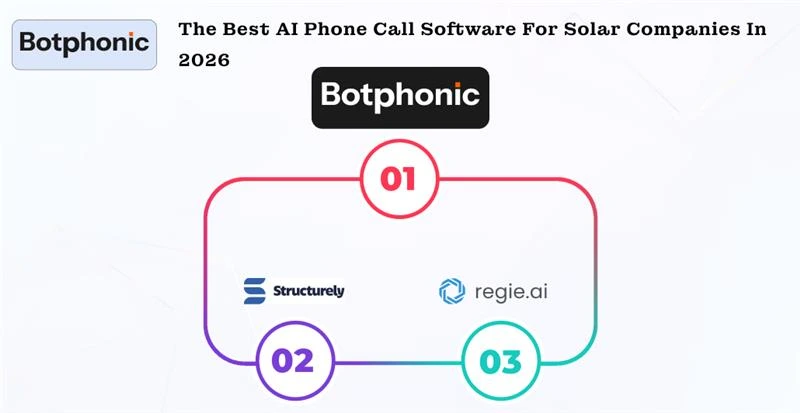
We are going to discuss the most straightforward breakdown of tools based on performance, reliability, and alignment with solar workflows.
1. Botphonic
Botphonic AI checks more boxes than you expect it to in the industry-specific criteria. But most importantly, there are a few differentiators that make solar companies appealing.
Pros
- The system speaks naturally, with realistic cadence.
- Detects client’s emotional cues in conversation.
- Offers inbound and outbound support.
- Designed to handle a number of calls at once.
- Easy customization in pre-built templates.
- Provides 24/7/365 availability, which ensures no leads are missed.
Cons
- Some users may show resistance towards AI.
Who It’s Best For
Suitable for small-sized companies to enterprises, as it offers custom pricing for enterprises and an affordable range for startups and small-sized companies.
2. Structurely
Structurely has built its reputation in the real estate industry. But it’s slowly getting its recognition in the solar industry for lead nurturing and inbound engagement.
Pros
- Offers strong follow-up scripts
- Effective for SMS + AI-assisted text
- Solid for reactivating older solar leads
- Enhanced CRM connections
Cons
- Voice abilities lag behind when compared to other tools.
- Not specifically trained for solar qualification out of the box.
Who It’s Best For
Smaller teams or companies that want AI to “warm up” cold or old solar leads before human reps get to them.
3. Regie AI
Regie AI is considered one of the heavy hitters in sales automation. It offers voice, email, and sequencing, too. It is powerful but leans towards enterprise.
Pros
- Multi-channel sales automation
- Custom voice workflows
- Strong reporting
Cons
- Might make you feel like bringing a bulldozer to plant a garden.
- Pricing is better-suited to mid-to-large teams.
- Needs manual tuning for solar use cases.
Who It’s Best For
Growing companies might need a full-funnel automation suite
Quick Comparison
| Platform | Strengths | Limitations (vs Botphonic) | Best Use Cases in Solar |
| Botphonic AI | Human-like voice, sentiment analysis, multilingual, summary & feedback, inbound & outbound | – | Lead qualification, appointment setting, re-engagement, bill collection, 24/7 callback |
| Structurely | Strong in follow-up (especially via SMS), good CRM integration | More text/SMS heavy; less mature for voice-first or complex call flows | Warm-up of old solar leads, text-based reactivation sequences |
| Regie.ai | Multi-channel (email, voice, sequences), advanced campaign orchestration | Enterprise-oriented, higher cost for smaller teams, not built out-of-the-box for solar incentives or bill qualification | Scaling operations, managing multi-touch sales sequences, and combining email + call automation |
Why Botphonic Is the Most Preferred AI Phone Call Software for Solar Providers Right Now
Putting it all together:
- Botphonic’s voice quality is among the most realistic available, which matters when you’re building trust with homeowners.
- Its sentiment analysis helps the call feel more human, so your AI doesn’t come off as cold or scripted.
- It supports both inbound and outbound calling, meaning it can handle new leads, reactivation, and live scheduling.
- Scalability and cost efficiency mean it’s not just for experimentation; it can scale as your solar business grows.
How to Successfully Implement AI Calling in a Solar Organization
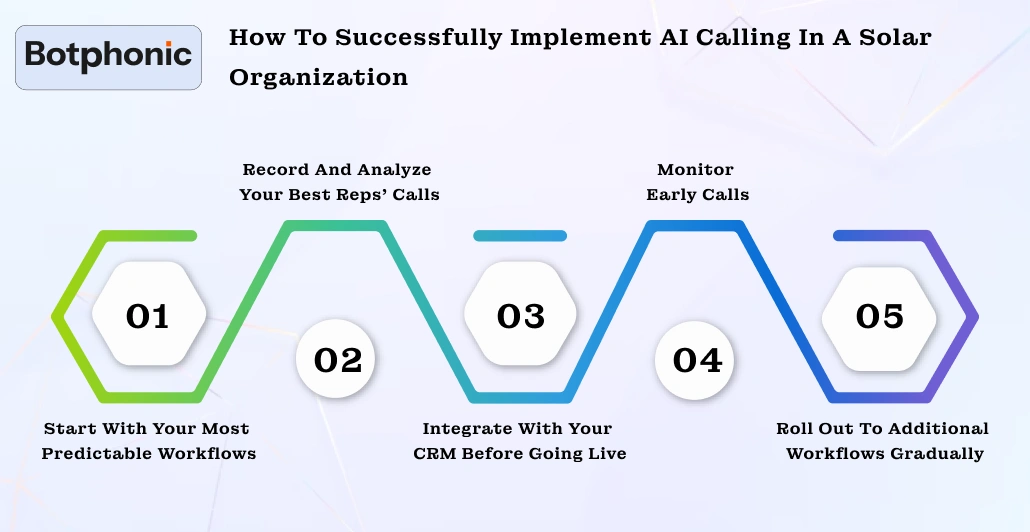
Just knowing about platforms isn’t enough; you should also know how you can implement your chosen tool successfully. To make your learning curve a little lower, let us share a practical game plan:
1. Start With Your Most Predictable Workflows
Don’t make AI responsible for every job in the sector. Start with:
- Speed-to-lead
- Re-engagement
- Simple qualification
- Appointment confirmation
It will help you deliver fast wins without lagging behind.
2. Record and Analyze Your Best Reps’ Calls
Train the AI on the tone, phrasing, and objection handling that’s already working for your company. It will make your work easier in training the AI in nuances and industry-related terminologies.
3. Integrate With Your CRM Before Going Live
Avoid the nightmare of double entry or worse, losing your data. Ensure to integrate the system with your pre-existing CRM or calendar tools to make work easier. There are many common issues that you might face due to bad integration, such as wrong lead status, missing call recordings, no qualification notes, and more.
4. Monitor Early Calls
After deployment, don’t forget to spend a week reviewing transcripts. Note:
- Wrong utility assumptions
- Incentive mismatches
- Tone issues
- Script gaps
Small tweaks also make a big difference in the system.
5. Roll Out to Additional Workflows Gradually
Over time, you can add other fields to be covered by the AI phone call agent:
- Bill collection
- Rescheduling
- Outbound nurturing
- Project update calls
Remember, slow and steady wins, rather than a fast and hasty situation.
Common Mistakes Solar Companies Make When Adopting AI Calling
Let’s spare you the pain of learning these the hard way. As per recent studies, it was estimated that global solar AI market size was about USD 5.96 billion in 2024 and it might reach to USD 18.43 billion by 2030.
1: Expecting AI to Replace Reps
Solar sales is not just about selling a product, but it also empathizes emotions, finance, and sometimes technicalities too. Always remember, AI assists, it doesn’t close deals.
Fix: Use AI for qualification, scheduling, reminders, and follow-up; let humans handle financial and technical discussions.
2: Using a Generic AI Not Trained for Solar
Solar industry has its own unique qualification needs, for instance:
- Utility provider
- Net metering rules
- Roof structure
- Shading
- Past energy usage
- Incentives
Just dropping a generic “sales qualification” AI script into a solar workflow will only create confusion. Solar incentives aren’t exactly simple. Get specific.
Fix: Build solar-specific flows with precise branching logic
3: Ignoring Latency & Voice Tone Issues
Your voice AI agent needs to respond as quickly as possible. Moreover, it should also sound natural so prospects don’t feel like talking to a robot. Solar prospects are already skeptical about the purchase. If your AI is taking too long, it might just result in lower trust.
Fix: Test real-world calls early. Tune voice settings and decrease latency before going live.
4: Bad CRM Integration
You might have chosen the right AI, which can hold conversations, but if data goes missing, the whole system suffers. It might just become totally useless for you and even result in an increased workload. Reps might go blind into calls, duplicate calls might annoy the clients, and eventually lead to lost opportunities.
Fix: Set up and test full CRM + calendar integration before flipping the “live” switch.
5: Overusing AI
Use humans where it matters:
- Complex objections
- Financial discussions
- Engineering specifics
- Final proposal review
AI should handle the grunt work, not the core sale.
Fix: Start with ONE workflow:
Speed-to-lead → then expand to reactivation → then confirmations → etc.
Put it to use today and see how AI transforms your lead conversation to AI lead conversion.
Try Botphonic Demo Now!!Conclusion
AI phone call software has become an essential tool; it’s not just a simple tool anymore, but a reliable partner. AI phone calls boost solar consultation and makes it easier to scale. Effectively helping boost speed-to-lead, mitigating repetitive tasks, and protecting lead investments. Most importantly, it also helps in providing sales reps with the capacity to concentrate on real and valuable conversations with real home owners.
Platforms like Structurely and Regie.ai bring value in their own ways, but Botphonic AI currently edges ahead for most solar businesses thanks to its natural voice quality, solar-specific intelligence, sentiment detection, and ease of deploying high-impact workflows.

